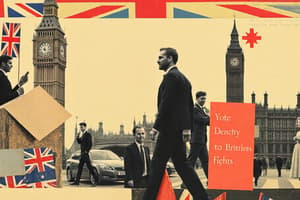Podcast
Questions and Answers
What fundamental right is described as an opportunity for citizens to have their voices heard and directly shape political outcomes?
What fundamental right is described as an opportunity for citizens to have their voices heard and directly shape political outcomes?
- Voting rights (correct)
- Right to privacy
- Right to protest
- Equality before the law
Which fundamental right ensures that individuals can freely express opinions, ideas, thoughts, and beliefs?
Which fundamental right ensures that individuals can freely express opinions, ideas, thoughts, and beliefs?
- Freedom of speech (correct)
- Equality before the law
- Right to privacy
- Right to protest
Which fundamental right involves protections against censorship or suppression of dissenting views?
Which fundamental right involves protections against censorship or suppression of dissenting views?
- Right to privacy
- Freedom of speech (correct)
- Voting rights
- Equality before the law
Which fundamental right guarantees every eligible adult citizen the ability to actively participate in elections through secret ballots without fear of reprisal?
Which fundamental right guarantees every eligible adult citizen the ability to actively participate in elections through secret ballots without fear of reprisal?
Which fundamental right is aimed at ensuring equal representation among all segments of society?
Which fundamental right is aimed at ensuring equal representation among all segments of society?
What is the main purpose of the principle of equality under the law?
What is the main purpose of the principle of equality under the law?
How does the right to protest contribute to society?
How does the right to protest contribute to society?
Which of the following best describes the significance of the right to privacy in a democracy?
Which of the following best describes the significance of the right to privacy in a democracy?
Why is it essential to maintain a clear line between peaceful demonstrations and civil disobedience?
Why is it essential to maintain a clear line between peaceful demonstrations and civil disobedience?
How do democratic rights contribute to creating a better world?
How do democratic rights contribute to creating a better world?
Flashcards are hidden until you start studying
Study Notes
Democratic Rights: A Foundation of Freedom and Equality
At the heart of democratic societies lie several fundamental rights designed to uphold justice, promote participation, foster free expression, protect individual dignity, and safeguard collective wellbeing. Let's explore these pillars: voting rights, freedom of speech, equality before the law, right to protest, and right to privacy.
Voting Rights
Voting is perhaps democracy's most powerful tool—an opportunity for citizens to have their voices heard, directly shaping political outcomes. Voting rights guarantee every eligible adult citizen the ability to actively participate in elections through secret ballots without fear of reprisal. These guarantees create accountable governments responsive to public opinion while ensuring equal representation among all segments of society.
Freedom of Speech
Democracy thrives when individuals can freely express opinions, ideas, thoughts, and beliefs. This right extends from private conversations to mass media outlets and includes robust protections against censorship or suppression of dissenting views. As stated by Thomas Jefferson, "Were it left to me to decide whether we should have a government without newspapers or newspapers without a government, I should not hesitate a moment to prefer the latter."
Equality Before the Law
Equality under the law means every person within a nation is entitled to identical legal status regardless of race, gender, religion, wealth, or other social factors. The principle aims to ensure fairness and impartiality throughout judicial processes, fostering trust between people and the state. In practice, this translates into laws that prohibit discrimination based upon personal attributes and encourage equitable access to opportunities such as education and employment.
Right to Protest
The right to peacefully assemble and petition one’s government serves as a vital check on unjust practices and enables citizens to raise awareness about important issues. Protests facilitate dialogues among diverse viewpoints, demonstrate shared grievances, and empower citizens to stand together for positive change. However, the line separating peaceful demonstrations and civil disobedience must remain clear; violent acts intended to undermine order do not fall within the scope of legitimate protests.
Right to Privacy
Respecting the confidentiality of personal information constitutes another essential cornerstone of any healthy democracy. The right to privacy ensures protection from excessive intrusions or surveillance, helping preserve autonomy over one's life choices. While there are certain situations where authorities might legitimately require sensitive data —such as investigating crime or protecting national security—these exceptions must always abide by strict standards that minimize interference with citizens' lives and liberties.
In summary, democratic rights provide individuals with the tools needed to nurture vibrant communities and maintain transparent governance. By embracing these freedoms, you contribute to creating a better world defined by justice, equity, and respect. Remember, your involvement matters!
Studying That Suits You
Use AI to generate personalized quizzes and flashcards to suit your learning preferences.




